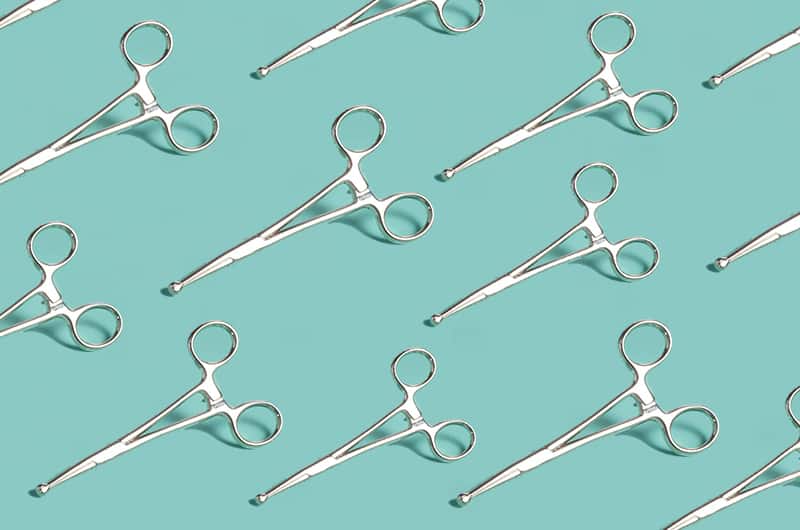
Why Are Men Scared of Vasectomies?
Written by Erin Feher
In the United States, women are more than twice as likely to get surgically sterilized than men are to get a vasectomy. This is despite the clear evidence that vasectomies are equally effective, less invasive, and carry a lower risk of complications—oh, yeah, and despite the fact that most of these women have already done the not-so-minor work of carrying and birthing children. Yet, as articles such as this recent one in The New York Times has demonstrated, many men are still squeamish at best, and chauvinist at worst, in their reasons to refuse to take responsibility for family planning.
One subject, Chris Lopez, explained that the ability to rear children was directly tied to his beliefs about masculinity. He also had some “practical” concerns. “Maybe I meet a younger woman or something like that and she wants to have kids, and then I can’t give that to her,” Mr. Lopez said.
But it’s not just men making things difficult: While the Affordable Care Act required insurance companies to cover 18 types of contraception used by women, including sterilization surgery, with no co-payment required, male sterilization is less likely to be covered, and even when it is, there is typically a co-pay. Out-of-pocket costs can range from $0 to around $1,000.
Still, money rarely seemed to top the list of concerns for men who were unenthusiastic about the procedure. Many women we spoke to said their partners admitted to fear of the actual procedure and of any long-lasting side effects that might effect sexual performance.
So, we gathered some real stories from men who have opted for the snip (as well as this handy FAQ from the experts at the Mayo Clinic). Here are their candid (and anonymous) experiences on what happens during a vasectomy—the good, the bad, and the swollen.
“I took my pants off and sat on the chair Winnie The Pooh style. The doctor eventually came in and gave me a local anesthetic—right at the incision point on my tenders. That probably hurt the most, as much as any local anesthetic does (a quick prick). Then he cut and pulled out the vas deferens on one side, clamped either side of it, cut it, cauterized each end, and put them back in. Then I believe he glued the incision as there were no stitches after the fact, just two VERY small cuts. He repeated on the opposite side and it was done. I felt a little tug once or twice but that was it. I drove myself home after that and watched some movies for the next two days. Recovery was very easy—ice packs (bag of peas) off and on when I could remember for the first couple of days. After 3 days I started to feel back to 70 percent normal. 5-7 days out I, felt back to 100 percent. And there has been no change to my sexual experience.”
“The actual surgery was the equivalent to a dental procedure that involves novocaine, i.e. filling a cavity. The shots delivering the anesthetic were a little uncomfortable, but really nothing in terms of pain. I was numb in about a minute and the doctor started the ol’ ‘Nippy Longstocking.’ It was all over in roughly 20 minutes. I was then taken to an area where a nurse gave me water, juice, and crackers, had me fill out the exit forms, and handed me the recovery information. Immediately after the surgery, I got on a bus and walked the rest of the way home (or kind of scuffled home, I guess). I took some ibuprofen and then fell asleep for a four-hour nap. I woke up, ate, and went right back to work. The scar healed up in two weeks and it all was really not that big of a deal. The experience of sex has changed dramatically. We can have sex now with reckless abandon. Just removing that bit of worry or guessing is huge!”
“The procedure itself was impersonal and fast. I’d not read the preparatory materials (as is my traditional style), so I didn’t shave myself as I was supposed to do. The nurse pulled out a janky disposable razor and aggressively shaved me without any lotion or soap. Start to finish it was 12 minutes. I felt some tugging and when I had a little pain during snip number two, they hit me with another shot of pain killer. The only unnerving part was the smell when they soldered the tubes closed. TMI? Anyways, it was over really fast and then it was time to watch college basketball. I felt normal immediately. I had almost no pain. No bad effects. I told my wife I’d do it again if I could. The only unexpected part was how long it took to come up with a clear sample after the procedure. 6 months until I was finally sperm free. But now: No condoms. It is the promised land.”
“The first thing they had me do was take a valium, but I don’t think it had much of an affect on me. Then they had me shave my testicles with a disposable razor, this was probably the most difficult part and I wish they would have had me do this before I came in! The surgery was very quick. I felt a bit of pinching and smelled some burning from the laser cutter. But after it was done I just walked out and my wife drove me home. Overall, the recovery wasn’t too bad. I worked from home and tried to take it easy for four days. The amount of bruising and swelling was surprising, though, my testicles were the size of a large orange and a deep purple color. That started to go away after the second day. It took about a week before I got completely back to normal. I had some testicular pain on and off for the first year, but it was minor and I don’t feel it at all anymore. As for sex, I think we’re more relaxed now because we know we won’t accidentally have another kid. Everything else feels exactly the same.”
Has your partner had a vasectomy? Did it all go down with or without drama? We’d love to hear from you in the comments about this sometimes loaded procedure.
Write a Comment
Share this story





>Many women we spoke to said their partners admitted to fear of the actual procedure and of any long-lasting side effects that might effect sexual performance.
The fly in the ointment with vasectomy, is while 98-99% of guys heal from it, about 1-2% simply do not ever heal from their surgery, and yes do have lasting side effects that can affect sexual performance and enjoyment.
I know this because I have a vasectomy and can tell you first hand — sex is not nearly as enjoyable. It is painful and disappointing, and I am sore for days afterwards.
And I am not alone. I collect stories from other men on social media and post them here: http://www.reddit.com/r/postvasectomypain
The bottom line is that vasectomy would be considered an unsafe procedure and would never be performed — except for the fact that men have no other reliable options whatsoever for preventing pregnancy, which has even worse risks.
What we should be doing is getting vasalgel to market. It’s far easier to reverse than a vasectomy, and men can be reassured that sexual side effects are uncommon, and what is more, if they do happen, the doctors will be able to offer a solution rather that just say “sorry, buddy, you accepted the risk.”
Ethan Fischer’s comment above is spot on. While vasectomy is considered a minor procedure, it’s potential, yet somewhat suppressed, repercussions certainly are not. To add insult to injury, Urology’s stance on post-vasectomy pain is often to blame the psychosomatic.
Aside from physical pain, many men are left dealing with depression, regret, inadequacy, and anger. A far cry from the ideal partner.
Don’t get the snip.